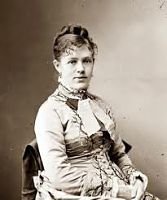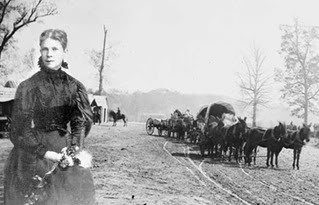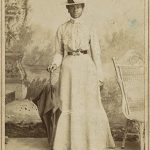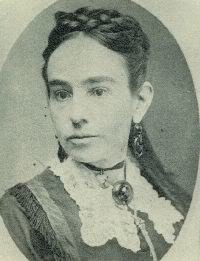Wife of General and President Ulysses S. Grant
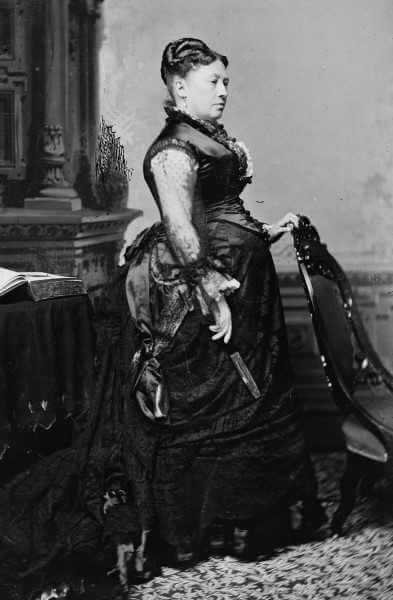 Julia Boggs Dent was born January 26, 1826 at White Haven plantation near St. Louis, Missouri, the fifth of seven children. Her parents were Frederick and Ellen Dent, who owned about thirty black slaves; they refused to free them only when the law required it. From about 1831 through 1836, Julia attended the Misses Mauros’ co-ed, one-room boarding school in St. Louis. Growing up at White Haven, she fished, rode horses, and played in the woods.
Julia Boggs Dent was born January 26, 1826 at White Haven plantation near St. Louis, Missouri, the fifth of seven children. Her parents were Frederick and Ellen Dent, who owned about thirty black slaves; they refused to free them only when the law required it. From about 1831 through 1836, Julia attended the Misses Mauros’ co-ed, one-room boarding school in St. Louis. Growing up at White Haven, she fished, rode horses, and played in the woods.
Image: First Lady Julia Dent Grant, 1870
Julia Dent met Ulysses S. Grant, whom she called ‘Ulys,’ who was a classmate of her brother Frederick at West Point; she was soon head-over-heels for Grant and agreed to wear his West Point ring. Julia thought Ulys was “the nicest and handsomest man I ever saw.” They became engaged in 1844, but his service in the Mexican-American War kept them from marrying until 1848.
Julia and Ulys
The Grants treated each other with love and respect throughout their thirty-seven-year marriage. Though they often faced adversity, their bond survived, stronger than ever. She followed him to distant outposts but returned to her parents’ home when he went to the West in 1852. Grant resigned his commission two years later, gratefully ending that separation. However, farming and businesses he attempted in St. Louis always failed.
In 1860 Grant moved his family to his hometown of Galena, Illinois. By this time, they had four children:
Frederick Dent Grant (1850-1912): soldier and public official.
Ulysses Simpson Grant, Jr. (1852-1929), known as ‘Buck’: lawyer.
Ellen Wrenshall Grant (1855-1922), known as ‘Nellie’: homemaker.
Jesse Root Grant (1858-1934): engineer.
Grant worked in his father’s leather goods store in Galena until he joined the Union Army in 1861. During the American Civil War, Julia joined her husband whenever possible.
Ulysses S. Grant in the Civil War
After so many years of hardship, Julia Dent Grant delighted in her husband’s success as a general in the American Civil War. Her most vital role was to provide a constant flow of support to her husband. She lived with him at his headquarters whenever possible; when she could not be there, she wrote and replied to a massive amount of correspondence between them; she made financial decisions, managed their property, and oversaw the education of their children. The security Julia provided to General Grant by taking these responsibilities off his shoulders allowed him to concentrate his energies on winning the American Civil War.
Through the first three years of the Civil War, Grant had fought in the Western Theather, which encompassed military operations in the states of Kentucky, Tennessee, North Carolina, South Carolina, Georgia, Alabama, Florida, Mississippi, and Louisiana east of the Mississippi River. Battles west of the Mississippi River were in the Trans-Mississippi Theater.
In March 1864, President Abraham Lincoln elevated Grant to the rank of lieutenant general, and named him general-in-chief of the Armies of the United States. Grant then came East and made his headquarters with the Army of the Potomac in Virginia. In early May 1864 Grant began what would be named the Overland Campaign and vowed to defeat General Robert E. Lee whatever the cost.
Grant attacked Lee May 4 in the Battle of the Wilderness, a three-day battle with many casualties. Grant did not retreat as previous commanders had done, but attempted to wedge his forces between Lee and the Confederate capital of Richmond. Lee’s army marched a few miles down the Brock Road to Spotsylvania Court House and entrenched. A deadly thirteen-day battle ensued. On May 12, Grant attempted to break through Lee’s strong defenses in one of the fiercest assaults of the Civil War; it would be called the Battle of the Bloody Angle.
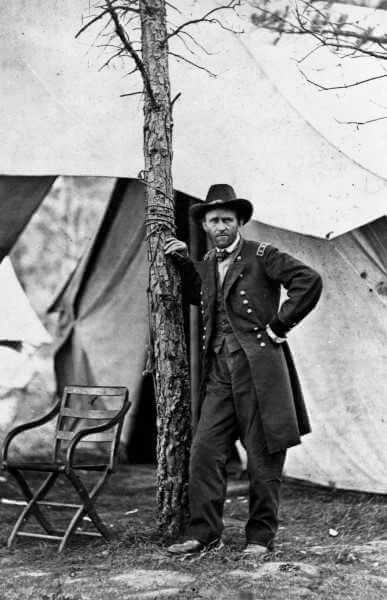
Grant flanked the Confederates, and the armies fought for three days at the Battle of North Anna and then marched on to Cold Harbor, but Lee’s Army of Northern Virginia always had the defensive advantage. General Grant was heavily criticized in the North for the heavy tolls taken in these battles: 52,788 casualties in thirty days.
Undetected by Lee, Grant left Cold Harbor and moved his army south of the James River and advanced toward the city of Petersburg, Richmond’s most important railroad hub. The Army of the Potomac arrived at Petersburg, which was defended by General P.G.T. Beauregard and men too old to fight and boys too young.
By June 18, 1864, Grant had nearly 100,000 men at Petersburg, but the 20,000 Confederate defenders held on as Lee hurried his Army of Northern Virginia into the entrenchments and began a nine-month siege of Petersburg. Knowing that further attacks would be futile, Grant’s army settled down for a prolonged siege of Petersburg.
By early April 1865, General Lee’s troops were starving, and Confederate railroads failed to provide food for them. Grant ordered a general attack on all fronts. The Army of Northern Virginia fled under heavy fire; Petersburg, and then Richmond, fell to the Union. Less than a week later, Lee surrendered at Appomattox.
Julia in the White House
After the Civil War, President Andrew Johnson named Grant the Secretary of War. In 1868, Ulysses S. Grant ran against Johnson and was elected eighteenth President of the United States. Julia Dent Grant entered the White House in 1869 and began what she considered “the happiest period” of her life.
Julia had been born with what is commonly known as “crossed eyes.” When she was young, an accomplished surgeon had offered to fix them surgically, but Julia declined. When she became First Lady, she thought about having the surgery, but the President objected:
Did I not see you and fall in love with you with these same eyes? I like them just as they are, and now, remember, you are not to interfere with them. They are mine, and let me tell you, Mrs. Grant, you had better not make any experiments, as I might not like you half so well with any other eyes.
With Cabinet wives as her allies, she entertained extensively and lavishly. She held many events at the White House and became a popular hostess. Julia sought more prestige for the position of first lady and worked to improve the stature of all wives of government officials: the Cabinet, the Congress, the diplomatic corps, and the Supreme Court.
On May 21, 1874, First Daughter Nellie Grant married Algernon Charles Frederick Sartoris in a grand White House wedding in the East Room, which had been extensively redecorated. Sartoris was a wealthy English singer and nephew of famous actress Fanny Kemble.
After the White House
Upon leaving the White House in 1877, the Grants began a two-year world tour that took them to Europe, Africa, and Asia. They were graciously received by crowds of admirers wherever they traveled, and they received many magnificent gifts. Julia and Ulysses then settled in New York City to enjoy their retirement from public life. But in 1884 the brokerage firm of Grant and Ward failed, and they lost everything.
In early June 1884, the general was diagnosed with cancer at the base of his tongue, which was described as “a malignant squamous epithelioma, which was a scaly, invasive, metastasizing growth.” He had admittedly smoked cigars from an early age and once admitted to smoking as many as 12 cigars in one day, most likely during the Civil War, and the result of that was this insidious disease that caused him much pain and sapped his strength.
Grant’s Memoirs
Seeking to provide some financial security for his wife, Grant began writing his memoirs soon after being diagnosed with cancer. He was originally offered 10% royalty on sales, but his friend, author and publisher Mark Twain, gave Grant a $25,000 advance and promised to pay 75% royalty to his family. His physician, Dr. John Douglas, realized that the summer heat in New York City would be too much for the ailing former president; Grant’s friends the Drexels offered their cottage on the slopes of Mount McGregor in the Adirondack Mountains.
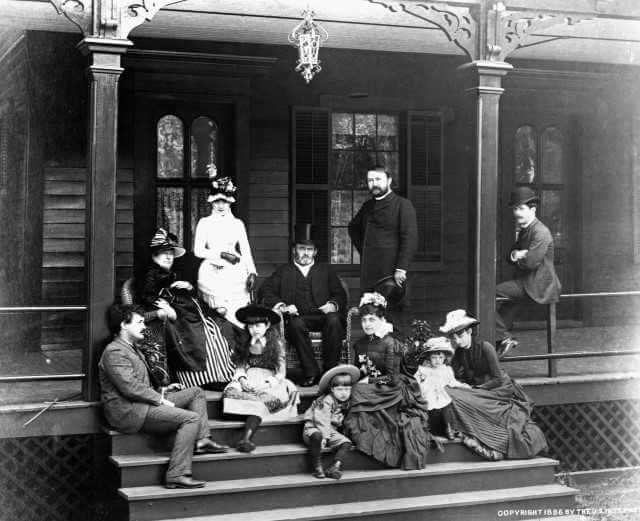
Ulysses S. and Julia Dent Grant (seated on porch) at Grant Cottage
Surrounded by their daughter, sons, daughters-in-law, and grandchildren
President Grant arrived at the Drexel Cottage (soon to be renamed Grant Cottage) on June 16, 1885, with a large entourage of family, friends, servants, and physicians. He would spend the last six weeks of his life there, writing feverishly, knowing his time on Earth was limited. His health deteriorated rapidly. He found speaking difficult, and he was weak and in great pain as he struggled to complete his manuscript.
Lieutenant General and 18th President of the United States Ulysses S. Grant died of throat cancer on July 23, 1885 with Julia by his side – three days after the final proofreading of his memoirs. His body was taken to New York City, where his funeral was held, the largest the city had ever seen.
Late Years
During the next two years, sales of the two volumes entitled Personal Memoirs of Ulysses S. Grant netted his family nearly $450,000 in royalties, saving Julia from poverty. She moved to Washington DC, the city she loved, and her daughter Nellie and three grandchildren came to live with her there.
Julia followed Dolley Madison‘s lead and acted as a “Queen Mother” figure, becoming friends with First Ladies Frances Cleveland, Caroline Harrison, and Edith Roosevelt.
First Lady Julia Dent Grant died in Washington DC on December 14, 1902 at the age of 76. She was laid to rest alongside her husband in Grant’s Tomb overlooking the Hudson River in New York City.
SOURCES
Wikipedia: Julia Grant
First Ladies: Julia Grant
PBS Biography: Julia Dent Grant
A Past Worth Visiting: Grant Cottage
